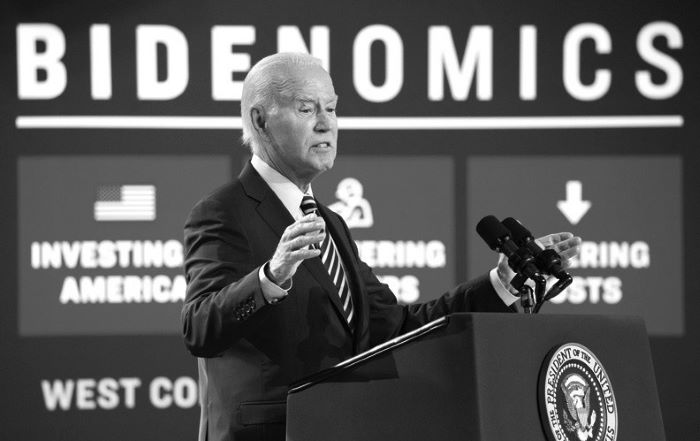Politics
Improved Economic Sentiment Isn’t Converting to Backing for Biden
Biden Economic: As the nation approaches the next presidential election, Americans find themselves divided over their perceptions of the economy and its potential impact on the political landscape.
Modest Uptick in Economic Optimism
Recent polling conducted by The New York Times and Siena College in late February unveils a nuanced picture of economic sentiment across the nation. Only 26 percent of registered voters currently view the economy as either good or excellent. However, there has been a noteworthy six-percentage-point increase since July. This uptick is particularly pronounced among older Democrats, a demographic traditionally supportive of President Biden.
“The recent poll by The New York Times and Siena College reveals a nuanced economic sentiment across the nation,” according to Bloomberg.
Biden’s Approval Takes a Hit
However, despite this modest improvement in economic outlook, President Biden’s approval ratings have experienced a decline. The latest poll shows a drop in satisfaction, with only 36 percent of respondents expressing contentment with Biden’s performance, down from 39 percent in July. This decline coincides with ongoing concerns over inflation. Since mid-2022, inflation has been a persistent issue, affecting the everyday expenses of many Americans.
Persistent Inflation Concerns
Inflation, though on the decline since mid-2023, remains a significant factor shaping consumer perceptions of the economy. The rising cost of goods and services, from groceries to insurance premiums, continues to be a top concern for voters. Nearly two-thirds of respondents in the Times/Siena poll rated the price of food and consumer goods as poor, underscoring the ongoing economic challenges faced by many households.
Voices of Frustration and Disillusionment
Individual stories reflect the broader sentiment of frustration among certain voter demographics. Mary Sandberg, a 45-year-old Democratic voter from central Kansas, highlights the struggles faced by others in her community. Katherine Besenty, a 25-year-old resident of New Jersey, expresses disillusionment with President Biden’s perceived inaction on economic issues affecting young people. Uncertainty about voting intentions in November mirrors a broader sense of frustration among disillusioned voters.
Cautious Optimism Amidst Uncertainty
Despite these concerns, there are signs of cautious optimism among some segments of the population. Thirty percent of respondents in the Times/Siena poll anticipate economic improvement in the coming year. This optimistic outlook provides a glimmer of hope amidst economic uncertainty.
Challenges for Biden Administration
As the election season intensifies, the Biden administration faces the challenge of effectively communicating its economic achievements. This task is especially daunting given the skepticism prevailing among the electorate. Factors such as Federal Reserve policies and inflation trends may influence economic sentiment in the months ahead. However, their impact on electoral outcomes remains uncertain. With deep partisan divisions over economic perceptions, the road to November promises to be fraught with complexity and uncertainty.
“Biden administration must effectively communicate economic achievements amid skepticism and deep partisan divisions for November’s election,” according to Barron’s.

